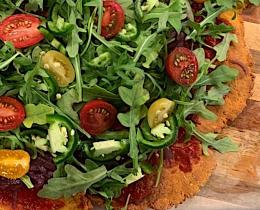Omega: How does your vision for a sustainable food system intersect with Omega's vision?
Michel: Omega's core values are very close to my own. Feeding people through food is a great joy and it's a great responsibility.
There's a great intersection between Omega's vision and my own personal vision because I believe that the food that we grow and cook and serve with love in the place that we call home really, truly defines us. It creates experiences and memories that can actually influence the growth of the spirit, the soul, and the body. Really caring where your food comes from and caring for the people that grow the food are consistent with the core values of Omega.
Personally, I care about these types of values because both of my parents were farmers, stewards of the land. After the second big conventional agricultural takeover, after World War II, they kind of lost their right to farm. Policies changed, and it was no longer viable to be a small-scale steward of the land, to be a farmer as a small business. But I was still raised on really good food, working what was left of my grandparents’ farms, understanding the difference between the flavor of a ripe tomato and a non-ripe tomato that's been shipped an awfully long way.
There was a chain of care in that small farm environment. When I became a young chef at the age of 21 working in kitchens, I didn't see any evidence of that chain of care. The pink tomatoes that came in the back door of that kitchen were perfectly round and flavorless. It didn't take long for me to understand where those tomatoes were coming from, how the workers were being treated, and how the land was not being stewarded. I felt that I needed to do something about that.
Omega: Can say more about this chain of care?
Michel: The chain of care with food begins at that microbial level in the soil. To be both healthful and vibrant, it really needs the hand of a person who deeply cares about those relationships and how to steward that life. That thoughtfulness looks at how to take care of the plants in ways that promote life, not only for those who are at the end of that chain of care, but for all of the insects, all of the microbes in the earth, and the water table, too.
The way a farmer treats the soil and the plants informs the way we treat the food in the kitchen. We don't look at, say, chard, as just something to be chopped, or sliced, or heated. We like to think more deeply of it and be more mindful than that.
If it's at the beginning of the season, I might want to grill the chard briefly because it has a kind of sweetness and a tenderness to it. If it's near the end of the season and it's gone through a couple of hard frosts, it will be sweet with vegetable sucrose. I'm going to want to really cook it to release the calcium and minerals that have built up so that the person who eats it gets the most nutrients out of it, but can also taste the sweetness of the sucrose that built up from that chard going through a couple of freezes.
Omega: What have you observed about the relationship between Omega and our local farmers?
Michel: Omega already had this amazing relationship with local producers when I started working with you in 2017. What Omega brings is 40 years of experience doing nothing but that. It takes a chef and a culinary team who is devoted to these types of values to be able to dig deeply and find ways that allow us to serve locally grown food all year round. For example, how can we have tomatoes show up on the menu in the spring or have strawberries show up on the menu in October because we preserved them? Pickled strawberries on a flatbread is one of the most remarkable things that you can eat. We want to have a food operation that celebrates the place we call home 100% of the time.
Omega: More and more fine dining restaurants are putting vegetables at the center of their menu. How do vegetables shine on Omega's menu?
Michel: First, we source them well. Second, we don't mess with them too much. When the produce is great to begin with, you don't need much. When you treat vegetables with the utmost respect, they will shine. Malcolm Sanz, Omega’s executive chef, really understands cooking time, cooking temperature, and multiple methodologies—that there's a way to serve the same leaf grilled, seared, dried, braised, or raw. He understands how to do all of it deliciously. They vegetables shine because he knows what to do with them.



